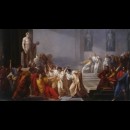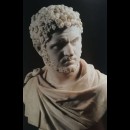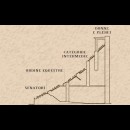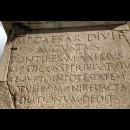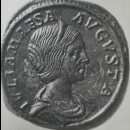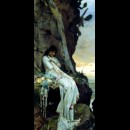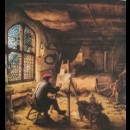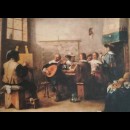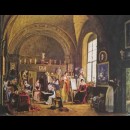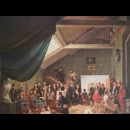THE SEVEN KINGS OF ROME...
After Romulus, an agreement was reached between the Romans and the Sabines. Roman senators would propose a Sabine king, and the Sabines a Roman king; then a choice would be made. The Romans proposed the Sabine Numa Pompilius, a pious man born on April 21, the day of the city's foundation; and no one objected.
A man of peace, in 42 years of reign he did not fight a single war. It was Numa who established the role of the *pontifex maximus*, which continued through the emperors to the Pope. Numa also created the first calendar divided into 12 lunar months (thus shorter than ours: every three years a month had to be added, until the reform of Julius Caesar). September was the seventh month, October the eighth..., and the year began in March, dedicated to Mars, the god of war. Numa comes from the Greek *Nomos*, meaning law; Pompilius from *pompè*, the sacred ceremonial robe.
According to tradition, Numa did not leave any male heirs. His daughter Pompilia bore him a grandson, Ancus Marcius, who was, however, only five years old. The child's father, Pompilia's husband, was a Sabine senator who hoped to inherit the crown, but another man, Tullus Hostilius, was chosen instead. Out of despair, he starved himself to death.
Tullus Hostilius expanded Rome's territory. The city was struck by a plague, and Tullus Hostilius himself fell ill. Only then did he invoke the mercy of Jupiter, who, indignant, struck him down with lightning—at least according to legend. He was finally succeeded by Ancus Marcius, and afterward came the Etruscans: the Tarquin dynasty, brief and violent, which was followed by the Republic.
Lucius Tarquinius, known as Priscus, was adopted as a son by Ancus Marcius, hence his succession. Tarquinius was killed by the eldest son of Ancus Marcius, who hoped to inherit the crown, but Queen Tanaquil, wife of Lucius Tarquinius, managed to place Servius Tullius on the throne. He was assassinated by the son of Tarquinius Priscus, Lucius Tarquinius, who would be remembered as Tarquin the Proud. Tarquin the Proud married Tullia, daughter of Servius Tullius, who aided her husband in the murder of her father.
MUZIO SCEVOLA (translated: the left-handed)
Tarquin the Proud asks for help from Porsenna, ruler of Chiusi, to defend himself from a revolt that wanted to establish the Republic. A Roman noble, Gaius Mucius Cordus, offers to penetrate the enemy camp to kill King Porsenna. The Senate approves.
Muzio mingles with the soldiers waiting to receive their pay, and stabs the one he believes to be Porsenna, without realizing that he is killing his scribe. Taken and brought before the ruler, he says: "It was you I wanted to kill. My hand failed, and now I punish it". Puis puts his right hand in the lit brazier, and leaves it until it is charred, in a horrendous sizzling. Porsenna is impressed and orders the release of the brave young man. Muzio will take the surname of Scevola which means left-handed.
In the end Tarquinius the Proud will be expelled from the city
LUCIUS QUINZIO CINCINNATO ....... and the city of Cincinnati
after each victory, Cincinnatus would leave the scene only to be recalled: the senators who came to offer him the absolute powers of dictatorship - a position that was only used in case of emergency - found him while he was personally plowing his own field. Cincinnatus put on the tolga, accepted the task, defeated the people who were enemies of the Aequi and distributed the spoils among his soldiers; after 16 days he renounced the dictatorship to return to his own field.
Posterity admired him greatly: Dante mentions him twice in the paradise, Petrarch includes him in his catalogue of illustrious men; the American city of Cincinnati, Ohio, is named in his honour
THE DEATH OF CRASSUS
The Parthians, the people who inherited the Persian Empire, the terrible warriors who for centuries held the Romans in check on the eastern frontiers, massacred the legions and their own leader at Carrhae. It is said that Crassus was beheaded and that to mock his greed, the king of the Parthians, Orodes, had molten gold poured into his mouth, saying: Aurum sitisti, Aurum bibe; you were thirsty for gold, and now you drink gold.A story that had struck Dante. In Purgatory the souls cry out: Crasso, tell us, since you know: what flavor does gold have?
![]()
Aurum sitisti, Aurum bibe;
(you were thirsty for gold, and now you drink gold)
Orode, king of the Parthians
![]()
![]()
Crassus, tell him, since you know: what tastes like gold?
Dante Alighieri. Purgatory
![]()
Veni Vidi Vici
Caesar was cruising on the Nile with Cleopatra. A golden boat, with a bedroom on board, went up the great river from Alexandria to the borders of Ethiopia. After 60 days Caesar returned to Alexandria, he had been in Egypt for nine months, and in the meantime the king of Pontus, Pharnaces, had rebelled against Rome.Pontus, a region on the southern shores of the Black Sea, was the natural route between the Mediterranean and Central Asia, and was therefore strategic: Rome absolutely could not lose it.
Caesar left, defeated Pharnaces, sacked his cities, sent gold, jewels and other treasures to Rome to display on the Capitoline Hill, with a sign:
Veni vidi vici
I have arrived, I have seen, I have conquered
![]()
You may have also made Terentia, the wife of Maecenas, and then Tertulla or Terentilla or Rufilla or Salva Titisenia, or all of them. But does it matter where and for whom you are raised?
Letter from Antony to Octavian
![]()

